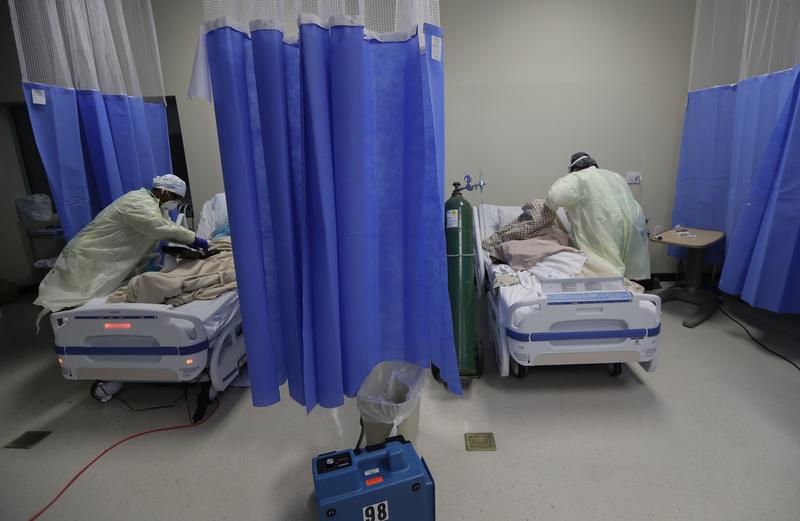Tanzina Vega: As we learn more about the coronavirus, we know that it can affect healthy people of all ages and that recovery can be an uphill battle.
David Lat: My name is David Lat. I'm the founding editor of Above the Law, a legal website, and the managing director in the New York office of Lateral Link, a legal recruiting firm. It started off with some fatigue, then, as the days progressed, I developed a high fever, going as high as around 104, joint aches.
Tanzina: David has been on The Takeaway before. He's 45, and he caught the coronavirus in early March in New York City before any of us really knew what the virus was and what impact it would have on us today. David talked us through what his experience was like.
[music]
David: In New York, in early March, there were not many cases of COVID, so I didn't think it was COVID. Later in the week, I developed a bad cough, and at that point, I called my primary care doctor. They thought it was maybe the flu that it turned into bronchitis. They prescribed me some antibiotics and some cough syrup. The cough, unfortunately, did not get better, and then, I started to have trouble breathing.
This was around the weekend of March 15, going into Monday, March 16. I went to my nearest emergency room at NYU Langone Hospital. They had to give me supplemental oxygen because I was already in pretty bad shape. They gave me a COVID test, and it turned up positive. They admitted me to the hospital. I was in the hospital in fairly stable condition for a few days, receiving supplemental oxygen, getting some medications, including the now-infamous hydroxychloroquine, which at the time, was thought to be potentially helpful, but my condition took a turn for the worse.
[music]
Sometime, late at night, someone came into my hospital room. I can't remember if it was a doctor or a nurse and told me I would have to be intubated or put on a ventilator. I was on the ventilator pretty much unconscious because they give you a lot of sedatives or anesthesia for about six days. That was a very scary experience, especially for my family. I was unconscious during the whole thing and I don't even remember anything about it much to this day, but my husband and my parents were just waiting and waiting for every update each day. They couldn't come visit me because the hospitals were not taking visitors that time, especially visitors of COVID patients.
Luckily, thank God, I did come off the ventilator. I was in the hospital for another week or so, essentially, learning how to breathe again. I was discharged from the hospital on April 1. I remember it was a Wednesday, April Fool's Day, and I went to my parents' home in New Jersey, which is where my husband and my son and I spent the first part of my post-hospital weeks recovering.
Recovery versus not being recovered is not exactly this binary thing, yes, no. It's not like turning a light switch on and suddenly you're recovered. It's more like a light switch on a dimmer function, where it gets a little bit brighter and a little bit darker and a little bit brighter. It's sort of two steps forward, one step back. It's a very long process. Just because you're recovered from COVID, doesn't mean that you live happily ever after. My lungs are still not the same. They're still not to where they were before, and I'm one of the lucky ones. There are a lot of people who are recovering from COVID, who has all kinds of problems, heart problems, kidney problems, blood clotting problems, cognitive and psychological problems.
We can't just think of the toll of COVID in terms of the deaths. It also means a lot of people who survive are living lives that are compromised by their having had this disease. Even though I am or maybe, I should say, was relatively young and healthy, I'm not invincible. I was in critical condition in the ICU for almost a week and that was a very terrifying experience. It just reminded me of my own mortality. I also wonder whether COVID is going to lead us to think about how we deliver healthcare in this country, just in terms of the cost and the accessibility of it. Having a disease like this, having an epidemic like this that affects millions of people and results in huge costs, is maybe a time of reckoning for us about our healthcare system.
[music]
Tanzina: That was David Lat, founding editor of Above the Law, a legal news website, and a managing director in the New York office of Lateral Link, a nationwide legal recruiting firm. We want to hear your experiences about living with and recovering from COVID-19. How are you doing weeks or months after contracting the virus? 877-8-MY-TAKE is our call-in line, and you could tweet us also. I'm @tanzinavega, and the show is @TheTakeaway.
Copyright © 2020 New York Public Radio. All rights reserved. Visit our website terms of use at www.wnyc.org for further information.
New York Public Radio transcripts are created on a rush deadline, often by contractors. This text may not be in its final form and may be updated or revised in the future. Accuracy and availability may vary. The authoritative record of New York Public Radio’s programming is the audio record.




